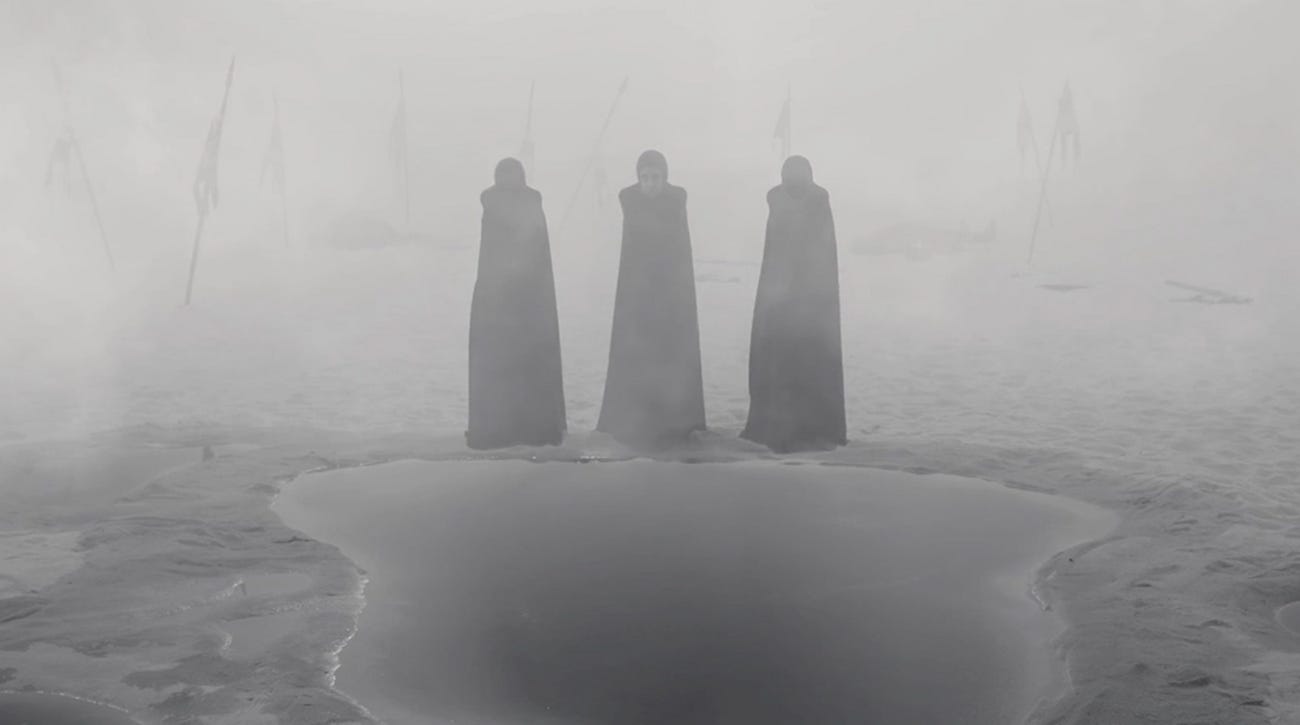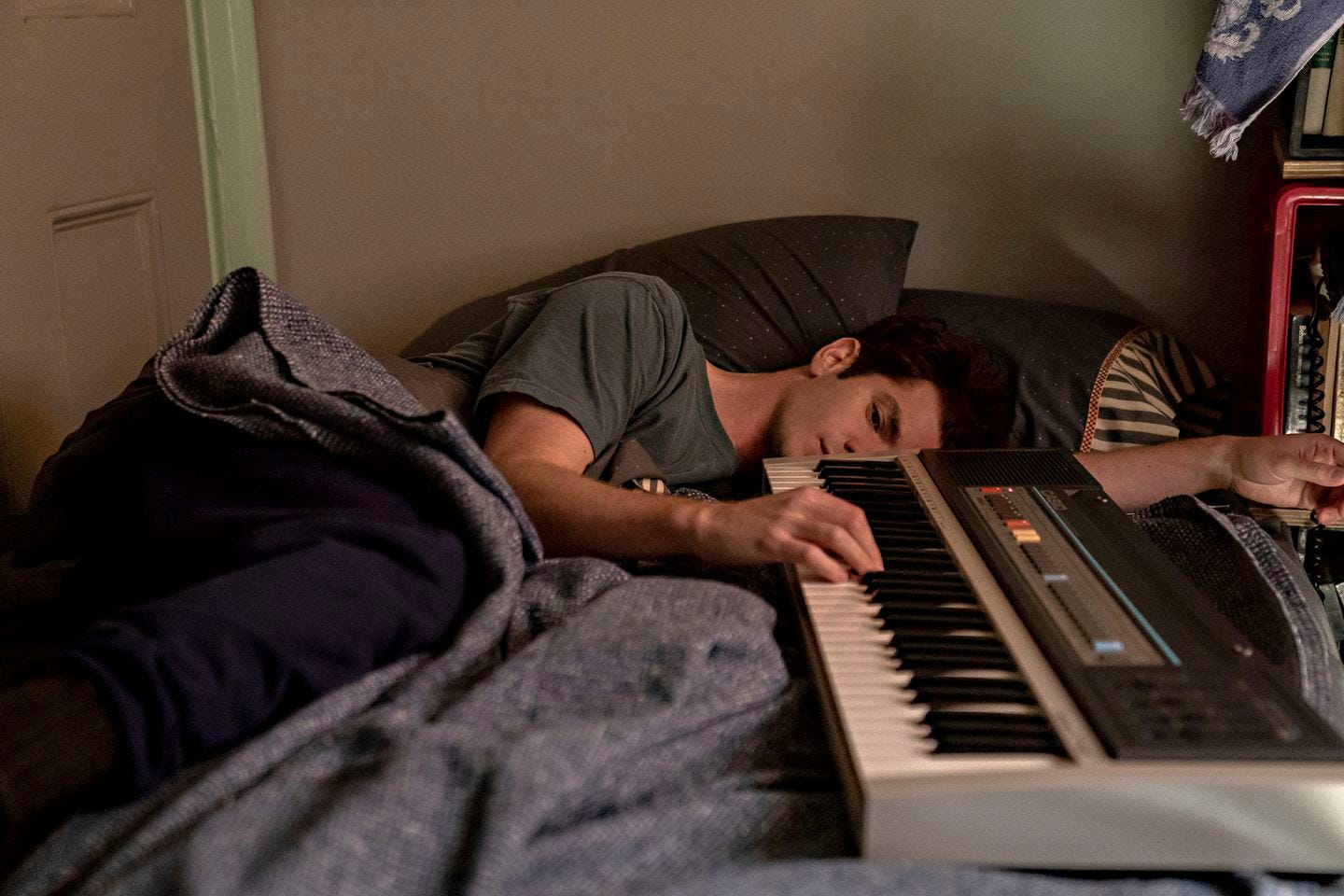It’s our first issue since this year’s Academy Award nominations were announced, and we’re extremely pleased to see we bet well with our reviews this week. While neither of the films in this issue nabbed a Best Picture nod, they did both get nominated in the Best Actor category for Denzel Washington and Andrew Garfield respectively. And we’re excited to recommend them both! First, Zosha tackles The Tragedy of Macbeth and the merits of its hermetic sensibility. Then Cate gets into Tick, Tick… Boom! and the limits of its very clear devotion. Happy movie yelling!
Zosha on The Tragedy of Macbeth
There’s a world in which Joel Coen laid Macbeth bare in an attempt to connect it to us. After all, as has been oft pointed out, the play was written shortly after Shakespeare lived through a plague period and an attempted insurrection of his government. Its generic tone can shift wildly depending on the production, from skulking supernatural horror to tragic political drama. As any Shakespeare in the Park production can demonstrate, his stories do have the not unique but still remarkable ability to lift from one timeline to another, shading in new areas of emphasis as they go. But no, Coen didn’t do that. Instead he made the landscape barren, cranked up the contrast, and made a Macbeth for the ages.
The world of The Tragedy of Macbeth is a stark one, colored in with shadows. It’s hermetic and stage-y — a strength, I think. Here we see how the bounds of Shakespeare, film, and acting swell to tell such a story. The story is as it’s always been: Macbeth (Denzel Washington, towering) is told by a trio of witches (played with absolute singularity by Kathryn Hunter) that he will be the next king of Scotland. His ambitious wife, Lady Macbeth (Frances McDormand, commanding) aids his attempts to cinch the throne, and before too long they are caught up in the villainy that comes with their power grab. If you know Macbeth then you know Tragedy, which slightly tweaks but mostly hues to the play as Shakespeare wrote it.
The force of it, then, is mostly in the presentation. It is a murderer’s row of performances, from Alex Hassell (sprung from live-action Cowboy Bebop obligations) as the slippery Ross to Stephen Root’s brief entry as the Porter. Anyone who has seen McDormand wear a stark garment on a red carpet knows the woman can play an autocrat for the ages. Washington’s strength lies in playing Macbeth as he would any other protagonist, pent up and unsure; at times, the Washington persona seems to eke out, simultaneously reminding you of the man’s oeuvre and making Macbeth seem a little more human.
Still, it’s Hunter who is the most memorable role. Her delivery is archly weird, making a meal out of the lines so often regurgitated in our culture. And yet, as the words spill out of her body the whole exercise snaps into place: Hunter contorts herself, literally, and the story follows suit. In lighter hands, Coen might’ve played her like Gollum, cutting so as to amplify the multiplicity of her role. But instead he just lets the camera watch her without commenting on the way she glooms the narrative. Her body moves like an insect, a spider slowly weaving around to ends unknown. It is spooky, even before you realize she is playing all the witches in one, before she is one body reflected three times in a pool.
In her performance the visuals click into place. This is an austere environment, all harsh whites and strong silhouettes. It feels fake in the same way that those optical illusion rooms at the science center do — which is to say “confoundingly real, even as the artifice is apparent. Yes, it looks like Kanye’s house, but it also looks like a sound stage, a modernist house, anywhere. It doesn’t feel timeless so much as it is unstuck from time, someplace not of sight and sound but of mind.
It’s here where I tell you that The Tragedy of Macbeth is a demanding watch. I’ve sat here puzzling over it for nearly 30 minutes and I don’t have a clear answer on “liking” it, but I know I respect it deeply; it’s not the sort of thing that you can tune out of, and I’m not sure I absorbed everything it has after one watch. It’s exciting, to see plays and movies like this. It roots itself in the legacy of both, and together they build something desolately intoxicating in the overstuffed realm of Shakespearean adaptation.
Cate on Tick, Tick… Boom!
It was only a matter of time before Lin-Manuel Miranda directed a film. So it’s completely on-brand that his debut feature would be a musical adaptation of the work of one of his heroes. Jonathan Larson’s semi-autobiographical Tick, Tick… Boom is fertile ground for a Broadway devotee-turned-veteran to set his roots in, and Miranda manages to unearth the story of a man whose legend has been set in amber since his death at the age of 35, on the very day of the first preview performance of his most famous work.
The film is beautifully rendered and expertly crafted. The immense research effort involved in this endeavor is readily apparent, and Miranda shows his work at every step of the way, pinching and smoothing aspects of the stage show to better fit the screen. But that instinct is at times a hindrance to the story. It’s akin to an overzealous book-report — in his eagerness to prove he’s done the work, Miranda overstuffs the film with winks and nods to viewers more familiar with Larson’s limited oeuvre. Cameos abound, and everyone from Daphne Ruben-Vega and Bernadette Peters to Philipa Soo and Renée Elise Goldsberry to Phylicia Rashad and Stephen Sondheim himself leaves their mark on the film, leaving little room for Larson himself to take up space. Nearly everyone you see onscreen can be traced back to either Larson or Miranda himself, and while the appearances are fun, they do not in and of themselves necessarily serve the story. In the same way that a reference is not a joke, a cameo is not narrative tissue.
But that isn’t to say that Larson doesn’t get any time in the sun. Andrew Garfield brings a frantic desperation to his performance that gets at the heart of the story’s themes. Larson feels like he’s running out of time — an idea that not so subtly runs through much of Miranda’s own work as well. The film’s framing device is the workshop of “Tick, Tick… Boom” the musical, which in turn tells the story of Larson’s efforts to have his musical “Superbia” produced. Larson feels that his life is ticking away, and is convinced that turning 30 will be the death knell of his creative career. As a result, he neglects his relationships and responsibilities in pursuit of the missing song he needs to complete his musical.
Living in New York in 1990, Larson is also surrounded by the ravages left by the impact of the HIV/AIDS epidemic on the city’s creative community. His friends are dying and his collaborators are withering away. As with Rent, the film missteps a little in its framing of the crisis through the eyes of a straight white man who did not contract HIV, but it is hard to fault Miranda for that choice given that it is a real part of what Larson tackled in his own work.
Of the supporting cast, Robin de Jesús stands out by a mile, bringing a subtle depth and pathos to his role of Michael, Larson’s best friend. Seasoned viewers will clock him as a cast member of both “Rent” and “In The Heights” on Broadway, linking him as a collaborator to both the creators at the center of the film. His frustration with Larson’s idling creativity reflects back on his own decision to give up acting and pursue a career in marketing. As a gay man with HIV, he actually is running out of time, and his choices reflect that.
It’s easy to nitpick the film and the choices made in its conception, but the truth is that as a full, realized project, it is quite an achievement. Miranda released three other musicals last year alone, and at least two of them show signs of the wear and tear of his own prolific output. But with Tick, Tick… Boom, he sidelines his composer hat to craft a musical out of one that already exists, sharpening his own skills in the process. It remains to be seen if he will continue to work almost exclusively in musicals (his work on Disney’s The Little Mermaid is still forthcoming) but in this debut, Miranda demonstrates that in the time since his career exploded, he’s been listening, learning and taking notes, and it’s made him a promising new director.
Assorted Internet Detritus
ZOSHA: A brief history of brands on Twitter. “It’s just an unremarkable Thursday night, and then it’s a Thursday night during the winter when things were bad.” The house that screams: Science is God. How TV romcoms evolved past HIMYM. Bel-Air and when representation isn’t enough. Down with Love girl!
CATE: The evolution of digital blackface, the real violence of Yellowjackets, the end of puzzle-box television, your burnout is burned out, Dave Chapelle and the “black ass lie,” art and adaptation on Station Eleven, the black manosphere, the advent of new queer cinema, and searching for Suzy Thunder.
If you’re just finding this newsletter, do us a favour and subscribe. It feeds our fragile egos. And if you’re already a loyal reader, help us out and tell a friend. Happy movie yelling!
Zosha + Cate <3
twitter:@30FlirtyFilm
instagram:@30FlirtyFilm









